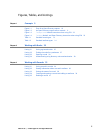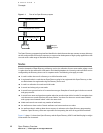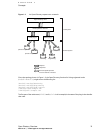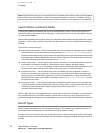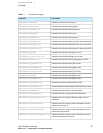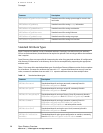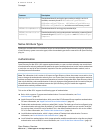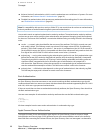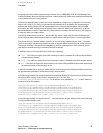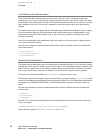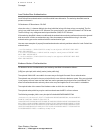
Note:An Open Directory plug-in is not required to return information that conforms exactly to the information
that the directory service maintains. A plug-in can generate information “on the fly.” In addition, a plug-in
may not return information about certain nodes; the plug-in's behavior in this respect can be configurable.
Search Policies and Search Nodes
A search policy defines the locations that are to be searched and the order in which those locations are
searched in order to get certain kinds of information. The first location that a search policy defines must be
the local NetInfo database.
Search nodes implement search policies, which are configured by administratorsthrough the Directory Access
application. Search nodes are easy for Open Directory applications to find and are guaranteed to always be
available.
There are four search node types:
■ authentication search node — Use this search node when you are looking for information that is needed
to authenticate a user. Use the pattern matching constant eDSAuthenticationSearchNodeName to
locate the authentication search node. Examples of applications that use the authentication search node
include the login window and applications that set System Preferences. The authentication search node
is also used indirectly by all UNIX commands that use lookupd.
■ contacts search node — Use this search node when you are looking for contact information, such as an
e-mail address, a telephone number, or a street address. Use the pattern matching constant
eDSContactsSearchNodeName to locate the contacts search node. Mail.app and Address Book use the
contacts search node to look up e-mail addresses and other types of contact information.
■ network search node — Use this search node, which consolidates all of the nodes that are local to a
machine for service discovery purposes, to find services on the local network. When third-party Open
Directory plug-ins are loaded, they register their nodes with Open Directory so they can be found by
the network search node. Use the pattern matching constant eDSNetworkSearchNodeName to locate
the network search node.
■ locally hosted nodes — Use a locally hosted node to find NetInfo domains stored on this machine (that
is, the local domain plus any shared domains that are running locally). Locally hosted nodes are a class
of nodes that have a special pattern match. Use the pattern matching constant eDSLocalHostedNodes
to locate locally hosted nodes.
When an Open Directory client application uses a search node to search for information, it can request the
fully qualified path for any record that matches a specific search criteria. As a result, Open Directory can
perform extremely precise searches and a high degree of control over the type of information that is returned.
Record Types
Apple Computer has defined a series of standard record types. The standard record types include but are
not limited to user records, group records, machine records, and printer records.
Providers of services can define their own record types (known as native record types) and are encouraged
to publish informationabout them. Developers areencouraged to use Apple’sstandard record types whenever
possible.
12
Open Directory Overview
2007-01-08 | © 2007 Apple Inc. All Rights Reserved.
CHAPTER 1
Concepts




